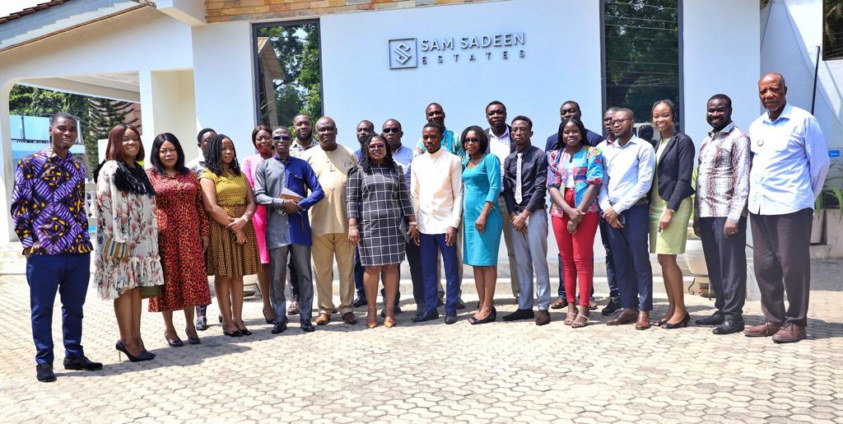Government has been urged to deepen its efforts of engaging, learning from and supporting local communities to adapt to climate change.
This recommendation came from participants of a one-day multi-stakeholder workshop organised by APRI -Africa Policy Research Institute (APRI), in collaboration with the Ghana Climate Innovation Centre (GCIC).
The workshop was part of activities aimed at sharing research lessons from the project, ‘Climate Change Adaptation in Ghana: Strategies, Initiatives, and Practices’.
the Head of the Climate Change Program at the Africa Policy Research Institute (APRI), Dr Grace Mbungu, stated in her opening remarks that the ‘Climate Change Adaptation in Ghana: Strategies, Initiatives, and Practices Project’ is aimed at understanding the progress, challenges and opportunities of climate change adaptation in Ghana with a particular emphasis on locally-led adaptation.
She stressed that locally-led adaptation empowers local stakeholders and gives communities a voice in decisions that directly affect their lives and livelihoods for greater impacts.
According to her, Ghana’s climate adaptation progress and actions risk being ineffective if it fails to adequately prioritise local-specific views, concerns, innovations and voices of local stakeholders.
She stated that “local communities that are at the frontline of climate change impacts are resourceful, capable, have deep understanding of their own complexities, and are always innovating to respond to climate change in unique ways. They often just need funding, decision-making spaces or other support to deliver their own effective adaptive solutions”.
A Research Fellow at APRI and Kwame Nkrumah University of Science and Technology, Dr Albert Arhin, presented preliminary results of ongoing research and engagement with national stakeholders and local communities across Northern, Middle belt, and coastal ecological zones.
He showed that communities are actively participating in different actions to adapt to the changing climate and its impact on their lives and livelihoods —but not without challenges.
He noted that climate-smart agriculture, community-based conservation actions, community-led irrigation systems, use of energy-efficient cooking stoves, recycling of waste, and local home elevation are a few of the strategies exhibited by communities to respond to different impacts of climate change on their livelihoods.
He stressed, however, that districts and communities do not receive enough support for the design and implementation of climate change adaptation interventions; and that communities have limited access to the resources (financial, human, knowledge etc) and agency needed to implement local innovative solutions effectively.
He concluded that the examples from the research provide important bedrock for Ghana, both central and local governments, to be deliberate in harnessing local knowledge, agency and power to support its adaptation efforts.
“An intentional approach to learning from local-specific vulnerabilities and adaptation responses would help the Ghanaian government capture innovative and indigenous practices that are led by communities, which are likely to be more effective and long-lasting to build the resilience of the communities,” he remarked.
The Acting Director of the Climate Change Unit of the Environmental Protection Agency, Dr Daniel Tutu Benefor, also made a presentation that highlighted key takeaways from the recently held climate change conference in Egypt (COP27) and their implications for Ghana’s progress towards advancing Locally Led Climate Change Adaptation in Ghana.
He noted that some of the national priorities for adaptation include reducing vulnerability, building resilience infrastructure, strengthening early warning systems, and promoting livelihood opportunities for the youth and women in climate-vulnerable agriculture landscapes and food systems.
Latest Stories
-
Gold Fields Ghana Foundation challenges graduates to maximize benefits of community apprenticeship programme
41 mins -
GBC accuses Deputy Information Minister Sylvester Tetteh of demolishing its bungalow illegally
52 mins -
Boost for education as government commissions 80 projects
1 hour -
NAPO commissions library to honour Atta-Mills’ memory
1 hour -
OmniBSIC Bank champions health and wellness with thriving community walk
1 hour -
Kora Wearables unveils Neo: The Ultimate Smartwatch for Ghana’s tech-savvy and health-conscious users
1 hour -
NDC supports Dampare’s ‘no guns at polling stations’ directive
1 hour -
Police officer interdicted after video of assault goes viral
2 hours -
KNUST’s Prof. Reginald Annan named first African recipient of World Cancer Research Fund
2 hours -
George Twum-Barimah-Adu pledges inclusive cabinet with Minority and Majority leaders
2 hours -
Labourer jailed 5 years for inflicting cutlass wounds on businessman
2 hours -
Parliament urged to fast-track passage of Road Traffic Amendment Bill
3 hours -
Mr Daniel Kofi Asante aka Electrician
3 hours -
Minerals Commission, Solidaridad unveils forum to tackle child labour in mining sector
3 hours -
Election 2024: Engagement with security services productive – NDC
3 hours

